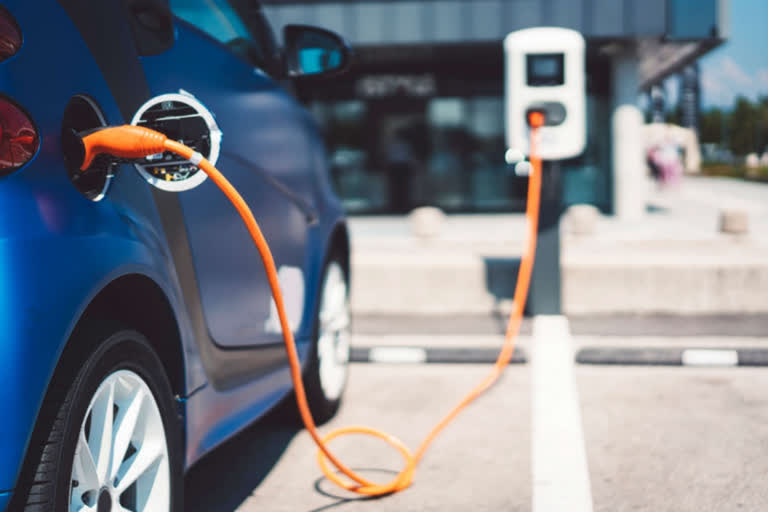New Delhi: India’s electric vehicle sale has nearly doubled this year in comparison with the sale of electric vehicles in the country during the last year, showed the latest official data. The sale of electric vehicles, for private, public and shared transport, has gone from less than 20,000 vehicles in the financial year 2019-20 to over 4.4 lakh vehicles in less than the first nine months of the current financial year that ends in March 2023.
In 2019-20, the government allocated a budget of Rs 10,000 crore for a period of five years -- 2019-20 to 2024-25 -- under Faster Adoption and Manufacturing of Electric Vehicles in India Phase II (FAME India Phase II). The scheme which is aimed to promote adoption of electric and hybrid vehicles (xEVs) in the country, will support electrification of public and shared transportation through subsidies for 10 lakh e-2 wheelers (e-2Ws), 5 Lakh e-3 Wheelers (e-3Ws), 55,000 e-4 Wheelers (e-4Ws) passenger cars, and 7090 electric buses.
As a result, the sale of electric vehicles has gone up from a little over 19,000 electric vehicles in the financial year 2019-20 to more than 4.42 lakh vehicles in the first eight months of the current financial year (from April 1 to December 9, 2022).
Also read: CSE and DST join hands to develop electric vehicle batteries that are suited to India
The data showed that 19,100 electric vehicles were sold in the country in 2019-20 and the number more than doubled in the next year when 48,179 vehicles were sold in the country in the financial year 2020-21.
However, as expected, despite the government’s push through subsidies and other policy measures, the sale of electric vehicles remained subdued due to the Covid-19 global pandemic as, during 2020-21, the country witnessed unprecedented lockdowns and travel restricts to slow down the spread of Covid-19.
However, as soon as the restrictions on the movement were lifted, the sale of electric vehicles in the country, the official data shows, skyrocketed from a little over 48,000 electric vehicles to nearly 2.38 lakh vehicles in the last financial year when a total of 2,37,811 electric vehicles were sold in the country.
In addition to the policy support provided by the government, the high prices of fuel, particularly the high prices of petrol and diesel also pushed the sale of electric vehicles as operating diesel and petrol-driven vehicles became prohibitively costly for the middle and lower-middle-income group.
The retail prices of petrol and diesel are in the range of Rs 100 and Rs 90 per litre respectively. High fuel prices coupled with subsidy support by the central and some state governments have pushed the faster adoption of electric vehicles despite some incidents of electric vehicles catching fire due to faulty batteries or heating problems in the batteries.
Also read: Indian army collaborates with TATA power to setup electric vehicle charging points
As a result, the sale of electric vehicles in the country rose from nearly 2.38 lakh vehicles during the last year to nearly 4.43 lakh vehicles in a little over the first 8 months of the current financial year. The latest data suggests that the sale of electric vehicles in the current financial year would more than double in the current financial year.
The latest official data shows that the country has 64 original equipment manufacturers and more than 7.47 lakh electric vehicles have been sold in the FAME India Phase II scheme. The data showed that more than 90 percent of electric vehicles, over 6,80,000 electric vehicles, have been sold in the country in the last 20 months alone.
India’s electric vehicle market
Several startups and established automobile makers have launched their electric two-wheeler (e2w) and (e4w). These include well-established automobile manufacturers such as Tata Motors which leads the pack in terms of sales of electric four-wheelers in the country with its line of electric Tata Nexon, Tata Tigor, and Tata Tiago.
While other automakers such as Hyundai Motors, Morris Garage, and Mahindra Group also offer electric four vehicles. However, the real action lies in the electric two-wheeler (mopeds and scooters) market that is driving India’s electric vehicle push.
This segment is dominated by startups such as Ola Electric founded by Bhavish Aggarwal who founded the country's leading cab aggregator Ola Cabs, in addition to other startups and established players such as Hero Electric, TVS Motors, Okinawa, Bajaj Motors, Ampere Group, and battery manufacturer Okaya Group, among others.
Also read: Rajasthan-based start-up revamps old vehicles into e-bikes
In response to a question, the government informed the Lok Sabha that in order to bring down the cost of electric vehicles to at par with the internal combustion engine vehicles (ICE), the subsidy support for electric two-wheelers, which is known as demand incentive, has been increased to Rs 15,000/KWh from Rs 10,000/KWh from June 2021, in addition to increasing the subsidy cap from 20% to 40% of the cost of electric vehicle.
In addition to this, the government is also promoting the manufacturing of Advanced Chemistry Cell (ACC) in the country through the Production Linked Incentive (PLI) scheme to bring down the cost of electric vehicles. Moreover, the GST on electric vehicles has been reduced from 12% to 5%; GST on chargers and charging stations for electric vehicles has been reduced from 18% to 5%.



